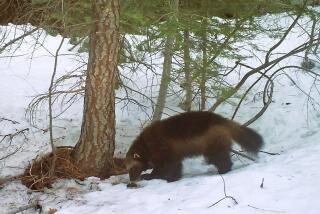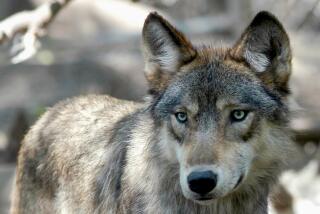Wolf Hybrids: Monsters or Man’s Best Friend?
According to Louis Sahagun, hybrid wolves are a curse of nature (“Modern-Day Frankenstein,” Aug. 17). As I read the article, curled up next to me on the sofa was a 6-year-old hybrid wolf, an offspring of an Australian dingo mother and an American timber wolf. This spayed hybrid has gone through puppy classes and professional dog training. During the six years I’ve had her, I’ve noticed only one bad trait: She is very stubborn. But she is still shy and wary of strangers, loves other animals and is quite devoted.
Maybe she’s one in a million, but I’d trust my life to her, and she’s shown that she deserves to be my companion. A dog, hybrid wolf or any animal is the product of the way it is brought up.
Budd Kops
West Hollywood
*
Wolf hybrids are not appropriate pets for most people. In my state, we are seeking restrictions and humane, safe standards as a prerequisite to ownership. It is a sad comment that legislation to protect not only these animals but also the people, pets and livestock living in close proximity to them has been the subject of lies and rumors fostered by the very people who claim to love the hybrids. The people who raise the most objections to fair legislation are likely to be the ones new regulations will primarily address.
Laurie Green
The Southern Alliance
for Animal Welfare
Nashville
*
Thanks for allowing Sahagun to explore the hazards of hybridizing the wolf in order to gratify some whimsical need for self-expression on the part of faddist breeders and innocent buyers. It is not the first time that Times reporters have attempted to alert the public about this problem.
Why then does The Times aid and abet these breeders by selling advertising space for wolf hybrids in its classified section, where, on a given Sunday, as many as half a dozen ads may appear offering them for sale as “dogs”?
Betsy Korbonski
Pacific Palisades
*
The Aug. 17 cover sensationalizes the image of an intelligent animal that is, for the most part, affectionate, shy and nonaggressive. It seems that modern man is still stuck in a hysterical, fearful mind set over the wolf that goes back to colonial days, and that could lead to the tragic extermination of this important link in the ecological chain.
We fear that Sahagun’s article, though well-written, will serve only those who favor bans, which would lead to the creation of a black market. Then breeders and owners would go “underground,” prices would soar and the animals would be considered more desirable than ever.
Jacque Evans, executive director
Barbara Berge, general manager
Candy Kitchen Rescue Ranch
Ramah, N.M.
Sahagun’s article has certainly changed my perspective on wildlife and dogs. I never knew people were breeding dogs with wolves. Imagine the torment these hybrids must be going through, inclined to follow their basic wilderness instincts but instead being cooped up by humans. And when they let their anger out--it’s their nature to attack--they are killed.
Wolves belong in the wilderness, not with humans. It is horrible that some people treat them as objects instead of as real-life creatures who yearn for freedom.
Sahagun’s article has made me further appreciate my two (domestic) dogs.
Amy H. Hwang
La Palma
*

